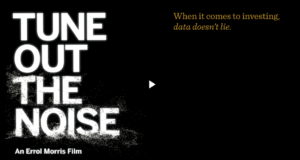Details Are Part of Our Difference
David Booth on How to Choose an Advisor
20 Years. 20 Lessons. Still Taking the Long View.
Making the Short List: Citywire Highlights Our Research-Driven Approach
The Tax Law Changed. Our Approach Hasn’t.
Movie Time
I invite you to watch an enlightening movie with me if you’re in STL on October 5th! Originally intended as an event for our firm’s clients, we decided that we wanted to share it with others and are saving a select group of seats for friends of our firm. The 88-minute documentary on the characters who changed modern finance for the better will leave you feeling smarter and more connected to the truth of successful investing. An Academy Award-winning documentarian made the film, and it is appropriately titled Tune Out the Noise. Watch the trailer and sign up here if you’d like to enjoy it with us at the spectacular Saint Louis Art Museum Farrell Auditorium.

*If you’re not in St. Louis, let us know if you’d like information on future screenings in additional cities by emailing us here.
More reasons to attend:
- Co-CEO Dave Butler will be live in attendance for a Q&A following the movie.
- This is the first film to tackle the academic, business, and practical themes connected to modern investing.
- Tune Out the Noise has yet to be publicly available.
- The Art in the film is, in many ways, its own story.
- The score is composed by the award-winning Paul Leonard-Morgan.
- During the “back to school” season, this is an excellent way to fulfill your lifelong learning commitment.
Welcome, Michael Kafoglis!
 We’ve added an incredible new team member, and you may recognize his last name. Michael Kafoglis joins our Client Service team as an advisor and CFP based out of our Houston Office. Michael will work closely with John Reagan, servicing our Hill and Hilltop clients. Michael comes to Hill Investment Group with seven years of experience at one of the largest investment institutions in the country, where he served as an advisor to high-net-worth families.
We’ve added an incredible new team member, and you may recognize his last name. Michael Kafoglis joins our Client Service team as an advisor and CFP based out of our Houston Office. Michael will work closely with John Reagan, servicing our Hill and Hilltop clients. Michael comes to Hill Investment Group with seven years of experience at one of the largest investment institutions in the country, where he served as an advisor to high-net-worth families.
As the son of a consultant turned teacher turned financial planner, he has a unique view of investing. Although he was taught concepts of compounding, diversification, and patience at a young age, when he became an advisor, he discovered his financial education was not the norm but the exception. Michael has made it his goal to educate clients and simplify their financial lives so they can focus on what they care about. Needless to say, he will fit right in at Hill Investment Group.
If his name sounds familiar, Michael is following in the footsteps of his dad, Charles Kafoglis, as he joins our team out of Houston. We are referring to them as the Kafogli and are already enjoying the camaraderie and banter they bring to the team. Stay tuned, as his complete bio will hit our site later next month.
Welcome, Michael!
Please Hold – Listen to This

Hill Investment Group prides itself on always having a team member, not a machine, answer our phones within two rings. We’ll never have an auto attendant answering system (during office hours) – but this means you will have to be placed on hold occasionally. Most hold music ranges from loud and irritating to the nonexistent ‘Is anyone still on the other end?’.
You’ve likely been placed on hold at Hill Investment Group, and we try to make that experience as pleasant as possible. Whether it’s an interview clip with one of our team members or jazzy holiday tunes – we aim to entertain or educate you while we connect you.
We’re excited to share our latest and coolest hold music, this time from one of our clients, Mr. Clint Willis. If, in 2016, you happened to be at the St. Louis launch party for Matt’s book Odds On:The Making of an Evidence-Based Investor, you might recall Clint’s soulful performance that served as a fantastic introduction (see photo).
During a recent interaction, and because Clint is such a creative person – I couldn’t help but wonder if he could create a mellow tune for our friends to enjoy while they’re on hold – and boy did he deliver! We hope you’ll enjoy our latest hold tune the next time you call or by clicking play above!

